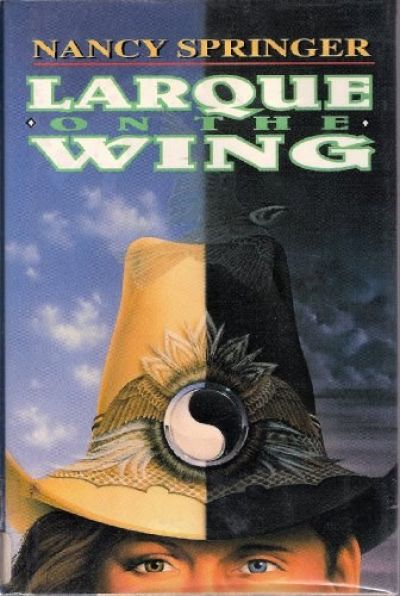Turn around and you’re tiny, Turn around and you’re grown
Larque on the Wing
By Nancy Springer

5 Nov, 2016
0 comments
Holy crap, it has been over a year since I wrote my last Tiptree Award review.
Nancy Springer’s standalone contemporary fantasy Larque on the Wing shared the 1994 Tiptree Award with Le Guin’s “The Matter of Segri.”
An outsider might say that artist Larque Harootunian is by many measures a success. She runs a thriving craft business; she’s married with children. Her marriage is somewhat unconventional, but it’s still within her comfort (or at least toleration) zone. The only notable off-notes in her outwardly successful life are the memories that haunt her.
Granted, almost everyone is haunted by the ghosts of their past …but what would be metaphor for anyone else is literal truth for Larque.
Larque is being visited by her own knobby-kneed ten-year-old self. Sky, as she called herself at ten, is not impressed by the woman she grew into or by all the small compromises of which Larque’s life is composed. Unlike previous spectral figures, Sky refuses to vanish. Like a lot of ten year olds, she refuses to be silent about the ways in which the world around her fails to meet her exacting standards.
Sky’s critique has a dramatic effect on Larque. She finds herself immobilized by artist’s block. If she cannot work, she cannot support her family. (Her husband Hoot’s virtues do not include being able to hold down a job.) Worse yet, the block frees up time in which she finds herself looking head-on at all the ways her life isn’t what she wants. She has taken on roles as wife, mother, and middle-class woman that hobble her.
Liberation arrives in form of Shadow, whose cowboy exterior hides profound gifts. Shadow can reshape Larque, grant her a bespoke body. Larque might be hemmed in by social and familial expectations; Lark — good looking, bold, gay, and male — is free.
But not only does this transformation place huge strains on her relationships, it leaves Lark vulnerable to further metamorphosis at the hands of the sufficiently strong-willed.
Few are stronger willed than Lark’s own mother.…
~oOo~
I spent a lot of the book wanting to smack Larque’s husband Hoot on the back of the head 1. He has kids; he doesn’t have the luxury of walking away from job after job. Or rather, he does only because he’s happy to offload as many responsibilities as he can onto Larque. And she inexplicably tolerates this, rather than doing the sensible thing: smothering him in his sleep so she can collect the life insurance.
Larque is also amazingly tolerant of her mother Florrie, whose iron-willed refusal to acknowledge unpalatable facts is challenged by the transformed Lark. Shadow’s remodeling job has left Lark vulnerable to further meddling, so that Lark’s mother can transmogrify her child into a Stepford Wife, pleasant to look upon and properly submissive to the demands of her husband and children. This is a role Florrie has never been able to fill herself, but she does not hesitate to enforce this standard on her child.
Freedom in this world isn’t just for men. It’s just for straight men. Shadow, who is gay, can expect to have the crap kicked out of him from time to time. Like Larque, he exists on straight male sufferance. He can only be himself in carefully sequestered (and hidden) safe places.
Of course, 1994, the year that this book was published, is very long ago. It would be so nice to believe that social progress is slow but inexorable. While Larque’s only out might have been a sex change in 1994, surely things would have improved in the last quarter century later. Perhaps they have … in small ways. Not enough.
Larque on the Wing is available here.
1: Men Who Need a Smack is a common feature in many feminist novels for some reason.
